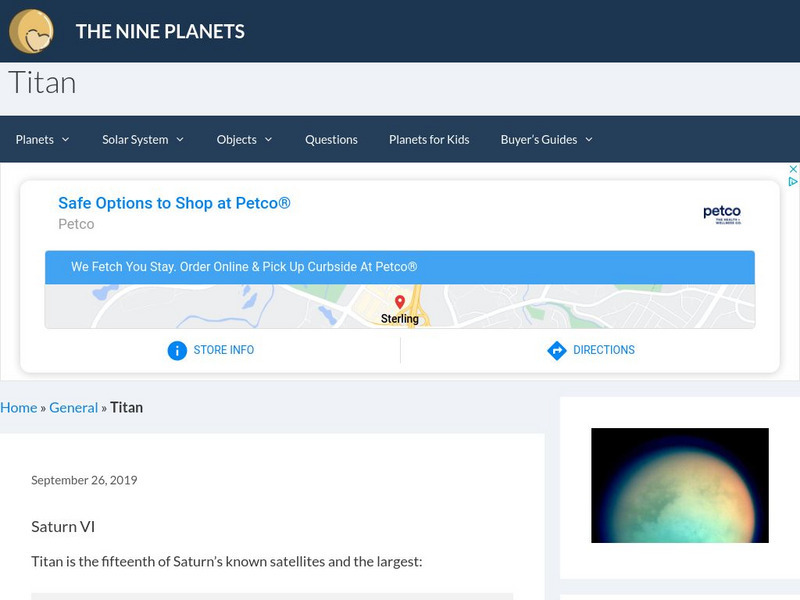Hi, what do you want to do?
Curated OER
Prairie Adaptations
Twelfth graders consider the survival of prairie plants. They examine how some tallgrass prairie species are adapted to the conditions of their ecosystem. They make a prediction of how a species might change given new conditions.
Curated OER
Let's Take a Rock Apart!
Students examine a crushed rock and sort the minerals they find in that rock by color and other properties.
Curated OER
A Whole Lotta Shakin'
Students read first hand accounts of earthquake survivors in order to begin the describe the different types of earthquake waves and the order in which they arrive. They engage in using earthquake waves as a means to indirectly study the...
Curated OER
Linkages Between Surface Temperature And Tropospheric Ozone
Students organize and analyze data regarding changes in tropospheric ozone and then hypothesize about the consequences of these changes.
Curated OER
Historical Harbor Habitats
Tenth graders create food web displays in the classroom. In this ecology instructional activity, 10th graders identify the different pollutants in the environment and their effect on organisms. They collect samples of sediments from the...
Curated OER
Troical Atlantic Aerosols
Students explore the effect aerosols have upon he weather and climate. They observe NASA satellite images to explore and draw conclusions about aerosol transport. From studying the images, students track the path of aerosols. They...
Curated OER
Seasonal Cloud Cover Variations
Students recognize different cloud types. They determine the seaonality of various types of clouds. They graph the data and determine if a correlation exists between season, cloud cover and type of clouds most prevalent during each season.
Curated OER
Floods: Rising Waters and You
Students examine the relationship between human-made structures, flood waters and the increasing population through video clips, websites and a lab experiment.
Curated OER
Shake, Rattle and Roll
Students compare the weathering of different-sized materials. Comparisons are made and data analyzed to reach conclusions about the process of weathering. Applications can be made for the higher grades.
Curated OER
Shake, Rattle and Roll
Students compare the weathering of materials. in this weathering lesson plan, students experiment with the chemical and physical weathering of different materials. Students use salt and water as an example of how weathering occurs.
Curated OER
Drifting Continents, Dynamic Results
Students plot earthquake and volcano data using a Compass Rose Plotting. They explain the relationship between plate movement and connection. They draw conclusions that earthquakes and volcanoes occur in predictable locations.
Curated OER
NOAA Research Project
Students research any topic relating to the National Oceanic and Atmospheric Administration (NOAA) research cruise that Mrs. Richards be participating in.
Curated OER
Environment Vocabulary and Definitions
In this environment worksheet, students are given a list of vocabulary words related to the environment and their definitions. Worksheet has no associated activities.
Curated OER
Weather Patterns
Students use yearly averages over a five-year period to understand weather trends for a specific area.
Curated OER
Using A Winogradsky Column to Analyze Microbial Communities
Students use easily obtained materials to study ecological succession in a microbiological community. They collect water samples from outdoor sources in plastic bottles to observe and record changes.
Simon Fraser University
Chem1 Virtual Textbook: Origin and Evolution of the Atmosphere
As part of the General Chemistry Virtual Textbook, this site examines a variety of topics related to the Earth's atmosphere. Included in the discussion are topics such as prebiotic atmosphere, origin of atmospheric oxygen, carbon...
BBC
Bbc: Gcse Bitesize: Damage to the Environment
The atmosphere has not always been the same. It has been much the same, but nevertheless now contains more nitrogen and oxygen, and less carbon dioxide, than it did when the earth first formed. Recently, the addition of greenhouse gases...
Massachusetts Institute of Technology
Mit: Open Course Ware: Courses: Civil Environmental: Ecology I: The Earth System
College-level online course highlighting the fundamentals of ecology. Course topics include coevolution of the biosphere, geosphere, atmosphere, and hydrosphere; photosynthesis and respiration; and the carbon, nitrogen, and water cycles....
Nine Planets
The Nine Planets: Titan
This site from The Eight Planets shows that Titan may serve as a model of a highly reduced early Earth atmosphere in which the first stages of organic chemical evolution could take place in the atmosphere.
Open Curriculum
Open Curriculum: Into the Mitochondrion: Making Atp With Oxygen
The aim of this article is to relate the history of oxygen in the atmosphere to the evolution of photosynthesis, aerobic respiration, mitochondria, and life on earth.
Other
Niagra College Canada: The Newcomen Steam Engine
Describes the evolution of Thomas Newcomen's steam engine development. Provides several photographs and sketches of Newcomen's machines.
Other
Kean: Weather Systems [Pdf]
No scientific phenomena concern us as much as the daily evolution of weather systems. We live in a culture where weather, the state of the atmosphere at a given time and place,helps us define regional cultural variations. States such as...
Curated OER
Unesco: Spain: Teide National Park
Situated on the island of Tenerife, Teide National Park features the Teide-Pico Viejo stratovolcano that, at 3,718 m, is the highest peak on Spanish soil. Rising 7,500 m above the ocean floor, it is regarded as the world’s third-tallest...


























![Kean: Weather Systems [Pdf] Unit Plan Kean: Weather Systems [Pdf] Unit Plan](https://static.lp.lexp.cloud/images/attachment_defaults/resource/large/FPO-knovation.png)